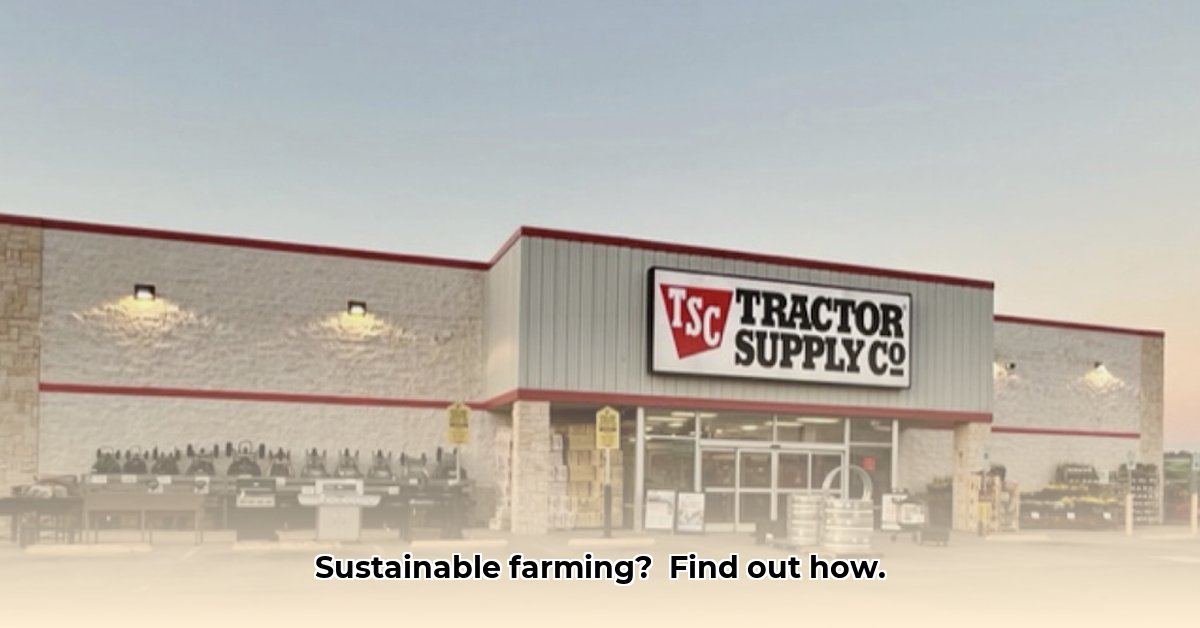
Harnessing Tractor Supply for Sustainable Agriculture
Tractor Supply Company (TSC) Bellaire, while not explicitly a "sustainability champion," offers a surprising wealth of resources for those committed to eco-friendly farming and gardening. This guide unveils how to leverage TSC's offerings to cultivate a more sustainable approach, examining both the opportunities and challenges involved. The key takeaway? Conscious consumer choices are paramount in transforming TSC into a partner in sustainable agriculture.
Think of TSC as a vast toolbox. It contains both conventional and sustainable options; the choice of which tools to use rests entirely with you. This guide empowers you to make informed decisions, minimizing your environmental footprint while maximizing your harvest.
Planting the Seeds of Change: Practical Steps for Sustainable Shopping
How can you effectively utilize TSC Bellaire's resources for sustainable practices? Follow these actionable steps:
Prioritize Organic: Choose organic seeds, fertilizers, and pest controls whenever feasible. This significantly reduces the environmental impact and potential health risks associated with synthetic alternatives. Look for OMRI (Organic Materials Review Institute) certified products for assurance.
Optimize Water Usage: Water conservation is crucial. Invest in water-saving irrigation systems like drip irrigation, available at TSC, to deliver water directly to plant roots, minimizing evaporation and runoff. Consider rainwater harvesting using rain barrels – also conveniently available at TSC – to supplement your water supply.
Embrace the 3Rs (and Compost!): Reduce, reuse, recycle—and compost! Opt for products with minimal packaging, consider reusable alternatives, and start a compost bin using readily available supplies. Composting reduces waste and creates nutrient-rich fertilizer.
Sustainable Animal Husbandry: If you raise livestock, prioritize animal welfare and minimize their environmental impact. TSC offers supplies supporting sustainable animal husbandry practices. These can range from improved feed choices to more humane housing options.
Support Local: Whenever possible, buy locally sourced seeds and supplies. This reduces transportation emissions and supports your local economy. Even if TSC doesn't explicitly list local options, inquire with staff about their sourcing.
Navigating the Trade-offs: A Balanced Perspective on Sustainability at TSC
Even with the best intentions, some challenges remain. Certain products, regardless of origin, carry inherent environmental risks. A realistic risk assessment highlights these potential pitfalls and strategic mitigation actions:
| Risk Factor | Likelihood | Impact | Mitigation |
|---|---|---|---|
| Pesticide Use | Moderate | Moderate | Prioritize organic pest control, adopt Integrated Pest Management (IPM). |
| Fertilizer Runoff | Moderate | High | Use slow-release fertilizers, employ precision application techniques. |
| Packaging Waste | High | Low | Favor minimally packaged or recyclable products. |
| Unsustainable Sourcing | Low | Moderate | Support transparent, ethically sourced products. |
Empowering Sustainable Practices: A Call to Action for TSC Bellaire
While conscious consumer choices are essential, TSC Bellaire itself can play a pivotal role in fostering sustainable agriculture. The company holds significant potential to become a leader in environmentally responsible practices. Here's how:
Enhance Supply Chain Transparency: TSC should improve transparency regarding its supply chain. Detailed information on product origins builds consumer trust and accountability.
Promote Sustainable Options: Eco-friendly products need greater visibility. TSC should prominently feature, and possibly even give preferential placement to, sustainable options making responsible choices easier for consumers.
Forge Strategic Partnerships: Collaborations with organizations dedicated to sustainable agriculture can expand TSC's reach and credibility, enhancing educational efforts.
Invest in Educational Resources: Providing educational resources – workshops, webinars, informative materials – empowers consumers with the knowledge to make informed, eco-conscious choices.
The common goal? A collaborative effort between TSC and its customers to promote sustainable practices. Through mindful choices and collective action, we can revolutionize how we farm and garden, building a more environmentally responsible future.